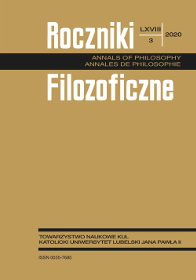God and Chance
Abstract
In the present paper, I analyse six concepts of a chance event (as defined by Dariusz Łukasiewicz) and also propose a definition of the term “random event.” Rejecting the existence of entirely causeless events, I discuss the relationship between random events and God. The view I formulate is based on three principles: the principle of simultaneous concurrence, the principle of complementarity, and the principle of middle knowledge (inspired by Luis de Molina). In adopting these three principles, I can reconcile the existence of God conceived in a classical manner, as Creator and Lord of all events, with the existence of random events. The model I propose provides an alternative to the conceptions offered by different currents of (more or less) revisionist (open) theism, including Łukasiewicz’s probabilistic theism.
References
Collins, Robert. 2009. “Divine Action and Evolution.” In The Oxford Handbook of Philosophical Theology, edited by Thomas P. Flint and Michael C. Rea, 241–61. Oxford–New York: Oxford University Press.
Flint, Thomas P. 2009. “Divine Providence.” In, The Oxford Handbook of Philosophical Theology, edited by Thomas P. Flint and Michael C. Rea, 262–85. Oxford–New York: Oxford University Press.
Flint, Thomas P., and Michael C. Rea, ed. 2009. The Oxford Handbook of Philosophical Theology. Oxford–New York: Oxford University Press.
Freddoso, Alfred J. 1994. “God’s General Concurrence with Secondary Causes: Pitfalls and Prospects.” American Catholic Philosophical Quarterly, 68 (2): 131–56.
Grabowski, Marian. 2019. Pierwociny stworzenia. Pomiędzy filozofią a fizyką. Toruń: Wydawnictwo Naukowe Uniwersytetu Mikołaja Kopernika.
Grabowski, Marian. 2020. “Is Probabilistic Theism a Tenable Idea? Critical Remarks on Opatrzność Boża, wolność, przypadek by Dariusz Łukasiewicz.” Roczniki Filozoficzne 68, no. 3: 205–220.
Howard-Snyder, Daniel, and Frances Howard-Snyder. 1994. “How an Unsurpassable Being Can Create a Surpassable World.” Faith and Philosophy 11 (2): 260–68.
Kretzmann, Norman. 1988. “God Among the Causes of Moral Evil: Hardening of Hearts and Spiritual Blinding.” Philosophical Topics 16 (2): 189–214.
Lewis, David. 1986. On the Plurality of Worlds. Oxford–New York: Basil Blackwell.
Łukasiewicz, Dariusz. 2014. Opatrzność Boża, wolność, przypadek. Studium z analitycznej filozofii religii. Poznań: W drodze.
Łukasiewicz, Dariusz. 2018. “Marcin Tkaczyk’s Ockhamism, or Whether the Theory of Contingentia Praeterita Is the Only Plausible Solution to the Problem of Futura Contingentia.” Roczniki Filozoficzne 66 (4): 115–34. https://doi.org/10.18290/rf.2018.66.4-6en.
Łukasiewicz, Dariusz. 2020. “Divine Providence and Chance in the World.” Roczniki Filozoficzne 68 (3): 5–34.
Moreland, J. P., and William Lane Craig. 2003. Philosophical Foundations for a Christian Worldview. Downers Grove, IL: IVP Academic, 2003.
Tkaczyk, Marcin. 2018. “The Antinomy of Future Contingent Events.” Roczniki Filozoficzne 66 (4): 5–38. https://doi.org/10.18290/rf.2018.66.4-11en.
Wojtysiak, Jacek. 2007. “On the Principle of Sufficient Reason.” Polish Journal of Philosophy 1 (1): 111–35. https://doi.org/10.5840/pjphil20071123.
Wojtysiak, Jacek. 2018. “Future Contingents, Ockhamism (Retroactivism) and Thomism (Eternalism).” Roczniki Filozoficzne 66 (4): 159–82. https://doi.org/10.18290/rf.2018.66.4-9en.
Copyright (c) 2020 Roczniki Filozoficzne

This work is licensed under a Creative Commons Attribution-NonCommercial-NoDerivatives 4.0 International License.





